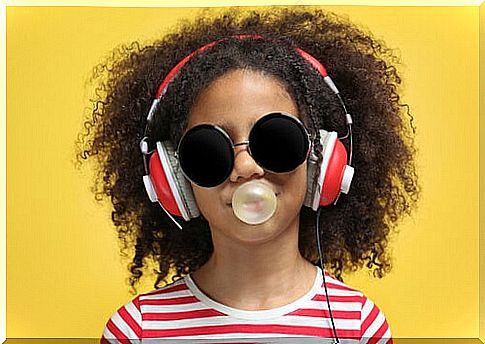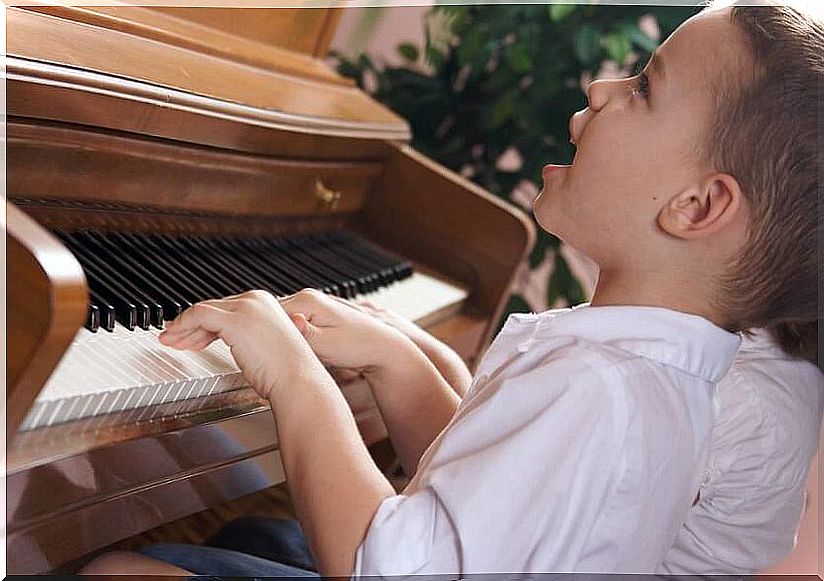9 Benefits Of Music In The Development Of Babies And Children

If there is one thing that human beings enjoy with great pleasure, it is music. This universal language not only connects us but benefits us in multiple ways no matter where we are in our lives. Reason why age does not discriminate at all.
And is that music is an art that stimulates from an early age. Its scope ranges from making people happy, helping them socialize, sensitizing, liberating, and much more. With regard to children, music enhances crucial aspects for the different phases of their brain development, starting with creativity.
Here are its 9 wonderful benefits during childhood. Through these benefits you will buy that music affects many aspects in the little ones and that they should know how to take advantage of it.
Music and the stages of development
Music is one of the arts that most benefits human beings in all their stages of development. From the third trimester of pregnancy, music can be used to stimulate the fetus with the music we listen to. In addition, the heart rate and the sound of the fluids that run through our body, set a musical precedent.
In pregnancy and the first months of life
During pregnancy, fetuses can recognize song melodies long before they know the meaning of the words. And according to Benenzon’s theory, human beings have, from the womb, a sound identity. This identity, he calls it “Gestalt sound identity”.
During the first months of life, we can see the effects of musical harmonies in children. In trying to dance and sing, we notice his liking for certain types of rhythms and the movements and babbling that he performs based on them. These are the sounds that stimulate you physically.
In the first steps
Babies who are already learning to take their first steps love to move and try to imitate us so they can dance to the rhythm of the music. In general, family members usually hold the baby in their arms and wave their arms while they twirl, sing, and dance.
This is part of the stimulation and allows the baby to become familiar with certain types of sounds, to associate them with different movements. Then, when the baby can stand up and take a few steps, we can invite them to dance with us, without taking them so much in our arms, so that they can try new movements on their own. For example: bending your knees to go up and down to the beat of the song, and so on.
Preschool age
At this stage, children love to learn through music. And this is certainly the perfect age to explore their own voices and acquire rhythmic awareness, while learning other issues, such as the numbers 1 to 10, primary colors, and so on.

Very simple songs about familiar things are ideal to improve your communication skills, in addition, the development of both hemispheres of the brain is strengthened. Although, of course, we should not limit ourselves to preschool songs.
9 wonderful benefits of music
1. Improves the functioning of your brain
Music is related to high academic performance. A child who has had exposure to music has better brain development. Music stimulates parts of the brain that are related to reading, mathematics, and proper handling of the emotions they experience.
2. Improve your memory
A child with a rich, varied, and consistent musical training may come to memorize more easily. Especially when music is used as a means to achieve certain goals (study, paint, read, exercise, dance, etc.).
Participation in music enhances the following capacities in children:
- Concentration
- Attention.
- Memory.
3. Helps to socialize horizontally
Playing an instrument can help children put aside their shyness. A child who decides to be part of a musical group or some type of school band, learns to work as a team and communicate their ideas fluently. In this sense, music allows us to establish new links, strengthen existing ones and above all, to understand the importance of listening to others and good teamwork.
4. Improve your self-esteem
Children who fully enjoy music have greater self-confidence. By enjoying the well-being that rhythms and sound waves in general produce in them, their spontaneity is enhanced and this translates into both the personal and social development of the child.
In this sense, it is very important to remember that children should not be asked too much, since this will only frustrate them and make them hate how beautiful the music hobby can be, or even their passion. We must support them and know how to direct them without imposing ourselves on them. Nor should we predetermine their tastes, or limit them in any way.
If they learn to play an instrument, they may even discover that they can develop many skills that they may have known they had and this helps them to feel motivated, valuable and above all, capable.

5. Teach human values
With music the satisfaction can be immediate, but when it comes to learning a musical instrument, the first lesson in music is patience. In addition, they themselves will notice that it takes dedication, perseverance, effort and teamwork to see the results that are desired.
6. Relax, calm, invite reflection
Music in children and adults is the means to achieve relaxation and satisfaction. It is something that involves our lives directly or indirectly. With the help of music, we can help relax children and can be used in therapies to treat attention deficit and hyperactivity disorders.
7. Opportunity for constant learning
Sometimes a song is the best way to teach children something. Music education is increasingly popular for the excellent results it produces. Learning becomes fun, more dynamic, and more spontaneous.
8. Provide a means of expression
It is undeniable that the best way to express any kind of feeling or emotion is through music. A good decision is to let the children choose an instrument and a type of music that allows them to channel their creative energy. Although they may prefer one style to others, the important thing is to encourage them a taste for diversity and teach them to enjoy and understand at least a little of everything.
9. Discipline, have fun, among others
Especially when it comes to learning to play an instrument, it is essential that you get in the habit of practicing it every day. With a good routine, children will become more disciplined in different areas of their lives and this will bring them multiple benefits. However, discipline should not exclude healthy enjoyment. You have to know how to establish a fair balance.
Music works at intuitive levels, which is why it manages to subtly stimulate different aspects simultaneously in the human being. In the case of the little ones, music is a powerful element in achieving that balance between joy and enlightenment.










